Past Recipients of the Graduate Student Fellowship
The Philomathia Graduate Fellowship in the Environmental Sciences provides fellowships for graduate students studying issues related to the environment at UC Berkeley. Students are nominated to receive the award on the basis of their high level of academic distinction and exceptional promise.
2022 - 2023 Recipients
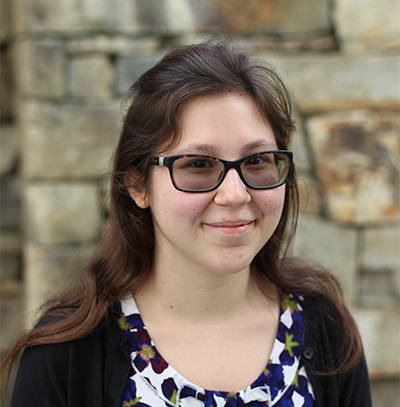 ALLISON E. BATKA
ALLISON E. BATKA
CHEMISTRY
Ph.D. CANDIDATE
Cellulose, the most abundant biopolymer on Earth, is an attractive alternative to fossil fuels for energy and the production of commodity chemicals. However, the high stability of cellulose poses a great challenge in its utilization as a renewable resource. In nature, the bonds between sugars are broken by enzymes such as polysaccharide monooxygenases (PMOs). To understand how to better degrade cellulose, Allie is investigating the mechanism of PMOs. Much is still unknown about the molecular mechanism of PMOs. Allie is specifically interested in identifying and understanding the rate-limiting step, timing of proton transfers, and intermediate structures in the PMO mechanism. In answering these fundamental biochemical questions, the results of this work will inform the design of new catalysts and materials for the biofuel industry.
 IXCHEL GONZALEZ-RAMIREZ
IXCHEL GONZALEZ-RAMIREZ
INTEGRATIVE BIOLOGY
Ph.D. CANDIDATE
Liverworts are a group of haploid plants that challenge our idea of what a plant is. They lack flowers, wood, roots, and sometimes even leaves! Yet, they are plants. In fact, palaeobotanical research suggests that some extant liverworts are morphologically similar to the first plants that ventured to land, over 400 mya. Despite their superficial fragility and “simplicity”, liverworts are diverse and widespread: these paradoxical plants occur from deserts to tropical rainforests; they can live in bare rock, on the trunk of trees, or even on top of an angiosperm leaf; and many individual liverwort species have very large geographic ranges. And so, many questions arise: Have liverworts changed much in 400 million years, and if not, why not, how not? How do single species maintain such big distributions? (or do they..?) Ixchel studies liverworts at multiple spatial and temporal scales. To know more about her research visit https://ixchelgzlzr.github.io
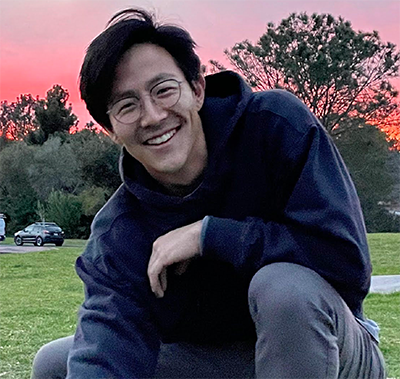 SOL KIM
SOL KIM
GEOGRAPHY
Ph.D. CANDIDATE
Atmospheric rivers (ARs) are long, flowing regions of moisture in the atmosphere – sometimes referred to as rivers in the sky. Globally, ARs are responsible for transporting the vast majority of water vapor towards the poles but regionally can have significant environmental and socioeconomic impacts. In the western U.S., ARs have accounted for roughly $1.1 billion in estimated flood damages per year. With growing populations, increased development, and climate change, risks of AR-driven flood damages are expected to increase. Despite posing enormous risks and damages, ARs are also essential for ending droughts and supplying water resources. Sol’s research examines various aspects of these features including the genesis of ARs, representation of ARs in climate models, detection of ARs in 3D and by using Deep Learning, and lastly, the ability of ARs to transport heat and energy.
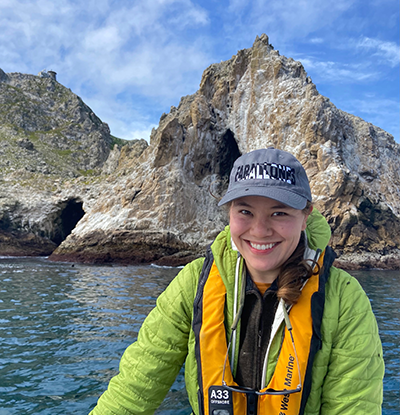 EMILY LAM
EMILY LAM
INTEGRATIVE BIOLOGY
Ph.D. CANDIDATE
The morphological and physiological adaptations that have allowed marine mammals to overcome the challenges associated with the recolonization of the aquatic environment confer unique life history traits that are uncommon in terrestrial mammals and have converged independently in distinct lineages. While these life history strategies make marine mammals interesting models to study adaptations to stress, perturbations characteristic of modern environments may increase marine mammals’ susceptibility to direct and indirect anthropogenic stressors. Emily is a PhD candidate in the Vázquez-Medina lab at UC Berkeley. She is broadly interested in studying how increased anthropogenic stressors in the world’s oceans affect marine mammals. Her projects seek to contribute to our understanding of the effects of stress exposure at different levels of biological organization in marine mammals from developing an ex vivo cell model to understand how stress hormones affect whale physiology to studying how changes in habitat temperature and quality alter thermoregulatory physiology and behavior in elephant seals. The results of these studies will provide direct evidence on the potential consequences of increased stress exposure on marine mammal biology and health.
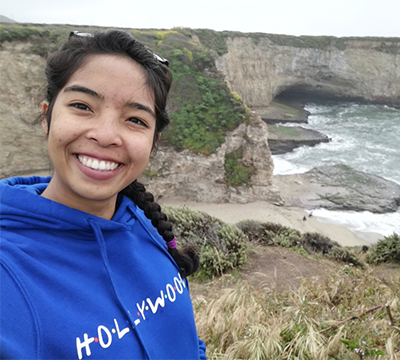 VERONARINDRA RAMANANJATO
VERONARINDRA RAMANANJATO
INTEGRATIVE BIOLOGY
Ph.D. CANDIDATE
Vero (veiru:) is a 2nd year PhD candidate in Razafindratsima lab. She is investigating the contributions of tropical nocturnal omnivores in the maintenance of plant diversity and the impacts of human activities on the seed dispersal processes in the tropics. As a Malagasy scientist, Vero has focused her research on the mouse lemurs in Madagascar, where she is one of the youngest researchers that have investigated the interactions of small-bodied and nocturnal primates with plants. Her PhD project involves a lot of fieldwork data such that she is expected to spend most of her summers in the rainforests of Madagascar, where she will capture-release mouse lemurs and other arboreal small mammals, track mouse lemurs at night using telemetry, and conduct several germination experiments with the seeds retrieved in the mouse lemur dungs.
 NINA SOKOLOV
NINA SOKOLOV
INTEGRATIVE BIOLOGY
Ph.D. CANDIDATE
Nina Sokolov is a Ph.D. candidate at UC Berkeley in Dr. Mike Boots' lab studying disease ecology in managed and native bees of California. She is interested in understanding how crop pollination events such as the almond bloom impact viral dynamics in pollinator systems. Specifically, she works on ranches and in gardens throughout Marin County studying honeybee and bumblebee viruses through time to see how management styles, ranging from migratory pollinator operations to feral colonies in the wild with no interventions, impacts bee health. Additionally, she works in the Sierra studying virus dynamics in an alpine wildflower pollinator system to understand the directionality of virus spillover between managed honeybees and native bees, and how diversity and floral preferences play a role in disease transmission.
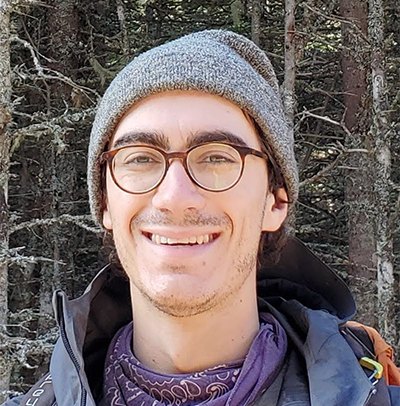 JOSHUA ZIMMT
JOSHUA ZIMMT
INTEGRATIVE BIOLOGY
Ph.D. CANDIDATE
Joshua Zimmt is a PhD candidate in Integrative Biology, working at the University of California Museum of Paleontology. He is studying the link between climate change and mass extinction in the fossil record, combining paleobiological, geological, and geochemical data to produce new insights into the history of life. His dissertation research focuses on the exceptional fossil and rock records on Anticosti Island (Québec, Canada) to understand how climate change may have caused the Late Ordovician mass extinction, one of the largest known extinction events. By producing a better understanding of this critical interval in the history of life, Joshua’s research will serve as a case study of global change that can be used to better understand our rapidly changing modern world.
Joshua holds a B.Sc. in geology from the College of William & Mary. In addition to his research, he is the student lead on the ACCESS program, an initiative by the University of California Museum of Paleontology to bring engaging paleobiology and geology lessons to community college classrooms around the country.
2021 - 2022 Recipients
 JACKIE CHILDERS
JACKIE CHILDERS
MUSEUM OF VERTEBRATE ZOOLOGY
Ph.D. CANDIDATE
Jackie’s research focuses on understanding the processes that underlie species diversification and phenotypic evolution by integrating analysis of character trait data with phylogenetic approaches. For her dissertation she is studying the Weavers (family Ploceidae), an Old World radiation of sparrow-like birds distributed throughout sub-Saharan Africa and Southeast Asia. The 117 species that comprise the family exhibit marked variation in plumage color, bill morphology, sociality and mating systems, and are best known for their elaborately designed nests. The primary goals of her research are to characterize the nest diversity across species, identify the selective forces that have influenced nest design throughout the family, and investigate molecular patterns of evolution using whole genomes. As part of this work Jackie has collected morphological data from museum specimens and their nests by working in natural history collections in both the U.S. and Europe. On campus, with the help of her undergraduate research assistants, she combines this data with DNA sequence data in order to address the broader goals of her research. Jackie's website.
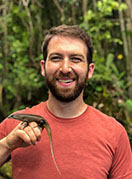 BENJAMIN KARIN
BENJAMIN KARIN
INTEGRATIVE BIOLOGY
Ph.D. CANDIDATE
Tropical rainforests hold most of the world’s biodiversity, yet the mechanisms leading to species diversification in these regions are still not well-understood. Skinks are the most diverse family of lizards with over 1,700 species, and the incredible diversity of skinks that have evolved on mountains on Sulawesi and Borneo provide a unique opportunity to study how species have diverged across elevational gradients. Ben, with his lab and colleagues in Indonesia and Malaysia, has conducted several major expeditions to remote mountains on Borneo and Sulawesi to investigate how elevational adaptation may act as a mechanism for species divergence. His research focuses on three genera of skinks (Eutropis, Sphenomorphus, and Tytthoscincus), each of which present strikingly different ecological strategies and rates of species diversification. By integrating genetic data and morphological variation with thermal physiological modeling across six different mountains on Sulawesi and two on Borneo, Ben is working to understand how these lizards have adapted to and diversified in their unique environments. Ben’s research has implications for how species will adapt to climate change, and his work to catalog undescribed species in this biodiversity hotspot is critical to conserving tropical biodiversity.
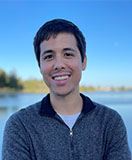 ADAM ULIANA
ADAM ULIANA
CHEMISTRY
Ph.D. CANDIDATE
Two out of every three people in the world now face severe water scarcity at least one month per year, due to factors such as growing water consumption, rising populations, and climate change. Water sources that are abundant (such as seawater) could supply the water that society needs, but these water sources need to be desalinated and detoxified before they can be used. Adam’s research focuses on developing new water purification methods that enable environmental remediation and supply safe water for human consumption. As part of his doctoral research, Adam applies synthetic chemistry to create new sorbent materials - called porous aromatic frameworks - and membranes that can be tuned to selectively capture deleterious pollutants from water. These contaminants include heavy metals, organic micropollutants, and salts.
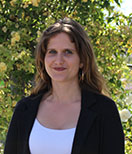 KIRSTEN VERSTER
KIRSTEN VERSTER
INTEGRATIVE BIOLOGY
Ph.D. CANDIDATE
Kirsten is a 5th year PhD candidate in the Whiteman Lab investigating how horizontal gene transfer can drive the evolution of novel adaptations in animals. Specifically, she is studying the evolution and function of horizontally transferred cytolethal distending toxin B (cdtB) genes in insects. cdtB encodes a DNase I enzyme that was transferred at least five times independently from insect symbiont-associated phages to drosophilids flies, galling midges and aphids. Interestingly, these horizontally transferred genes may play a role in protecting these insects from deadly parasitoid wasps. She is interrogating the evolution and function of cdtB using a combination of techniques including phylogenetics, CRISPR/Cas9 mutagenesis, bioinformatics, and immunohistochemistry. Kirsten's goal is to build a research and education program that incorporates her passion for animal evolution and functional genomics.
 ELISA VISHER
ELISA VISHER
INTEGRATIVE BIOLOGY
Ph.D. CANDIDATE
Why specialists exist in the face of broad-niched generalists remains a central question for the biological sciences. At a fundamental level, this question underpins most of our theories for why there is so much genetic, phenotypic, and species diversity in nature. Elisa Visher’s work focuses on the nature of trade-offs to resistance and infectivity breadth in host-parasite systems and on the environmental factors that bias systems towards selecting for specialists or generalists. They primarily use experimental evolution techniques in the Plodia interpunctella (Indian meal moth) and baculovirus model system to explore the geometry of trade-offs with host resistance, the effects of spatial structure and host genetic diversity on parasite niche breadth evolution, and the factors driving the coevolution of diversification. For more information about Elisa's research, see their website.
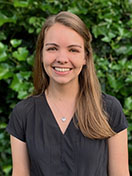 JEANNIE WILKENING
JEANNIE WILKENING
CIVIL AND ENVIRONMENTAL ENGINEERING
Ph.D. CANDIDATE
Globally, plants move massive amounts of water from the soil to the atmosphere through the process of transpiration. This process is not only physiologically important for the plant since it enables the uptake of carbon, but it also represents a major component of the water cycle. Jeannie’s research aims to explore how physical drivers (landscape characteristics, climate, etc.) interact with biological drivers (plant physiology) to determine how these interactions impact plant water use and plant health outcomes, particularly when water is limited. She explores these plant-water interactions using both modeling approaches and experimental/field studies in a variety of contexts. Better understanding of these dynamics can help to inform management of specific environmental challenges, with parts of her dissertation work focusing on landscape rehabilitation of former mining sites and containment of a plant pathogen. More broadly, her work helps us to understand and predict plant water use, water availability, and ecosystem function, particularly as we move towards a future where many parts of the world are hotter and drier under climate change.
 WENJING XU
WENJING XU
ENVIRONMENTAL SCIENCES, POLICY AND MANAGEMENT
Ph.D. CANDIDATE
Wildlife migration carries important ecological functions and social values in many ecosystems, especially in arid and semi-arid rangeland. However, linear infrastructures such as fencing have proliferated around the world. Wenjing's search focuses on ecological responses and consequences of migratory pronghorn and mule deer to landscape fragmentation caused by fencing in the rangeland of the American West. Using GPS tracking data and remote sensing imagery, Wenjing quantifies animals' behavioral responses to linear barriers and examines the ecological consequences of such changes in animal movement and habitat use. Her study adds empirical insights to the emerging subdiscipline of fence ecology and offers direct guidance to conservation decisions that aim to maintain and improve landscape connectivity.
2020 - 2021 Recipients
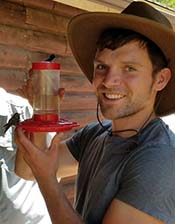 NICOLAS ALEXANDRE
NICOLAS ALEXANDRE
INTEGRATIVE BIOLOGY
Ph.D. CANDIDATE
Nicolas' research focuses on linking phenotypic variation with genotypic variation and fitness within species for complex, quantitative traits. Through fine-mapping of natural genome-wide variation, he is localizing putatively causal loci segregating as polymorphisms that underlie phenotypic variation for bill shape which can be subsequently tested for signals of selection. The bills of hummingbirds represent an excellent model for studying adaptive evolution in quantitative traits given their widespread distribution, feasible collection, and recently available genomic resources. To understand how genomic architecture of complex traits evolves in nature, he is implementing a combination of genome-wide association studies, niche modelling, pollen metabarcoding, functional experiments, and phylogenetic analyses to understand the link between evolution of complex traits within and between species.
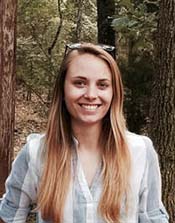 MALLORY BALLINGER
MALLORY BALLINGER
INTEGRATIVE BIOLOGY & MUSEUM OF VERTEBRATE ZOOLOGY
Ph.D. CANDIDATE
Understanding how organisms adapt to their environment is a major goal in evolutionary biology. Mallory’s research aims to identify the factors underlying environmental adaptation by integrating evolutionary analyses of DNA sequence variation with experimental studies of whole-animal physiology. Currently, she is studying small mammal populations that inhabit temperate and tropical environments across North and South America. Through the integration of population and comparative genomics, functional genomics, and whole-animal physiology, Mallory’s research ultimately aims to determine how small mammals colonize new environments and the signatures of subsequent adaptation to those new environments. For more information about Mallory’s research, visit her website here.
 STEFANO CESTELLOS-BLANCO
STEFANO CESTELLOS-BLANCO
MATERIAL SCIENCE ENGINEERING
Ph.D. CANDIDATE
Modern society is entirely reliant on accessible sources of ammonia (NH 3 ) as a fertilizer to meet agricultural needs for an expanding world population. However, industrial production of ammonia relies on fossil fuels consuming up to 3% of global yearly energy and contributing to local environmental pollution. Stefano strives to combine biological N 2 -to-NH 3 enzymatic pathways within bacteria with light-active nanomaterials. The goal of his research is to power N 2 -fixing bacteria with energy harvested from sunlight by semiconducting nanostructured materials. Stefano employs a variety of electroactive bacteria in his research while fabricating and synthesizing biocompatible nanomaterials.
 JACKIE CHILDERS
JACKIE CHILDERS
MUSEUM OF VERTEBRATE ZOOLOGY
Ph.D. CANDIDATE
Jackie’s research focuses on understanding the processes that underlie species diversification and phenotypic evolution by integrating analysis of character trait data with phylogenetic approaches. For her dissertation she is studying the Weavers (family Ploceidae), an Old World radiation of sparrow-like birds distributed throughout sub-Saharan Africa and Southeast Asia. The 117 species that comprise the family exhibit marked variation in plumage color, bill morphology, sociality and mating systems, and are best known for their elaborately designed nests. The primary goals of her research are to characterize the nest diversity across species, identify the selective forces that have influenced nest design throughout the family, and investigate molecular patterns of evolution using whole genomes. As part of this work Jackie has collected morphological data from museum specimens and their nests by working in natural history collections in both the U.S. and Europe. On campus, with the help of her undergraduate research assistants, she combines this data with DNA sequence data in order to address the broader goals of her research.
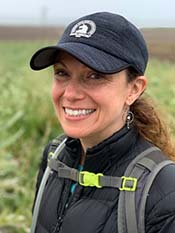 NATALIE GRAHAM
NATALIE GRAHAM
ENVIRONMENTAL SCIENCES, POLICY AND MANAGEMENT
Ph.D. CANDIDATE
Understanding how biodiversity might accommodate, resist, or collapse in response to pressures of global change is critical for the future health of the planet. What properties make a biological community more resilient or more susceptible to sudden change? Are changes integrated or rejected in predictable ways? Natalie’s research aim is to simplify the complexity of biodiversity dynamics by assessing metrics of stability in arthropod communities across the Hawaiian archipelago, using the age of the volcano, from about 50 years to 5 million years old, as a proxy for community complexity. Advances in next-generation sequencing allow her to rapidly asses species richness and abundance, incorporating tens of thousands of individual insects, spiders and other Arthropoda. Natalie then reconstructs ecological networks from biological interactions among herbivore-plant, predator-prey, parasitoid-host, using natural history information from the literature and associations of organisms in the field. Metrics based on the network structure, and how it changes over time, assist in forecasting how communities are adapting and responding to change.
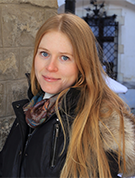 CLARKE KNIGHT
CLARKE KNIGHT
ENVIRONMENTAL SCIENCES, POLICY AND MANAGEMENT
Ph.D. CANDIDATE
Clarke’s doctoral research links basic tenets of forest carbon ecology to some of California’s most pressing environmental legislative goals. California is leading the international debate about the best way to manage forests to store carbon and mitigate climate change. Sustaining the State’s forests as reliable carbon sinks requires an understanding of the baseline carbon carrying capacity. The overarching goal of Clarke’s research is to understand the impacts of disturbance on forest carbon cycling and to develop a baseline of forest conditions for a high-priority landscape – Six Rivers National Forest in the Klamath Mountains. As a historical ecologist, she uses paleo-ecological data from fossil pollen records in lake sediments, witness tree data from public land surveys (conducted in the 1880s), and spatial interpolations from contemporary forest inventories to document long-term biomass trends in California. Clarke’s goal is to inform our understanding of the structure and function of forests before fire suppression and provide an opportunity to reassess assumptions about long-term forest carbon storage.
 ELISA VISHER
ELISA VISHER
INTEGRATIVE BIOLOGY
Ph.D. CANDIDATE
Why specialists exist in the face of broad-niched generalists remains a central question for the biological sciences. At a fundamental level, this question underpins most of our theories for why there is so much genetic, phenotypic, and species diversity in nature. Elisa Visher’s work focuses on the nature of trade-offs to resistance and infectivity breadth in host-parasite systems and on the environmental factors that bias systems towards selecting for specialists or generalists. They primarily use experimental evolution techniques in the Plodia interpunctella (Indian meal moth) and baculovirus model system to explore the geometry of trade-offs with host resistance, the effects of spatial structure and host genetic diversity on parasite niche breadth evolution, and the factors driving the coevolution of diversification. For more information about Elisa's research, see their website.
 WENJING XU
WENJING XU
ENVIRONMENTAL SCIENCES, POLICY AND MANAGEMENT
Ph.D. CANDIDATE
Wildlife migration carries important ecological functions and social values in many ecosystems, especially in arid and semi-arid rangeland. However, linear infrastructures such as fencing have proliferated around the world. Wenjing's search focuses on ecological responses and consequences of migratory pronghorn and mule deer to landscape fragmentation caused by fencing in the rangeland of the American West. Using GPS tracking data and remote sensing imagery, Wenjing quantifies animals' behavioral responses to linear barriers and examines the ecological consequences of such changes in animal movement and habitat use. Her study adds empirical insights to the emerging subdiscipline of fence ecology and offers direct guidance to conservation decisions that aim to maintain and improve landscape connectivity.
2019 - 2020 Recipients
 NICOLAS ALEXANDRE
NICOLAS ALEXANDRE
INTEGRATIVE BIOLOGY
Ph.D. CANDIDATE
Nicolas' research focuses on linking phenotypic variation with genotypic variation and fitness within species for complex, quantitative traits. Through fine-mapping of natural genome-wide variation, he is localizing putatively causal loci segregating as polymorphisms that underlie phenotypic variation for bill shape which can be subsequently tested for signals of selection. The bills of hummingbirds represent an excellent model for studying adaptive evolution in quantitative traits given their widespread distribution, feasible collection, and recently available genomic resources. To understand how genomic architecture of complex traits evolves in nature, he is implementing a combination of genome-wide association studies, niche modelling, pollen metabarcoding, functional experiments, and phylogenetic analyses to understand the link between evolution of complex traits within and between species.
 MALLORY BALLINGER
MALLORY BALLINGER
INTEGRATIVE BIOLOGY & MUSEUM OF VERTEBRATE ZOOLOGY
Ph.D. CANDIDATE
Understanding how organisms adapt to their environment is a major goal in evolutionary biology. Mallory’s research aims to identify the factors underlying environmental adaptation by integrating evolutionary analyses of DNA sequence variation with experimental studies of whole-animal physiology. Currently, she is studying small mammal populations that inhabit temperate and tropical environments across North and South America. Through the integration of population and comparative genomics, functional genomics, and whole-animal physiology, Mallory’s research ultimately aims to determine how small mammals colonize new environments and the signatures of subsequent adaptation to those new environments. For more information about Mallory’s research, visit her website here.
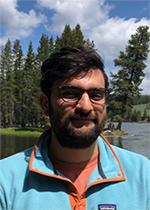 STEFANO CESTELLOS-BLANCO
STEFANO CESTELLOS-BLANCO
MATERIAL SCIENCE ENGINEERING
Ph.D. CANDIDATE
Modern society is entirely reliant on accessible sources of ammonia (NH 3 ) as a fertilizer to meet agricultural needs for an expanding world population. However, industrial production of ammonia relies on fossil fuels consuming up to 3% of global yearly energy and contributing to local environmental pollution. Stefano strives to combine biological N 2 -to-NH 3 enzymatic pathways within bacteria with light-active nanomaterials. The goal of his research is to power N 2 -fixing bacteria with energy harvested from sunlight by semiconducting nanostructured materials. Stefano employs a variety of electroactive bacteria in his research while fabricating and synthesizing biocompatible nanomaterials.
 NATALIE GRAHAM
NATALIE GRAHAM
ENVIRONMENTAL SCIENCES, POLICY AND MANAGEMENT
Ph.D. CANDIDATE
Understanding how biodiversity might accommodate, resist, or collapse in response to pressures of global change is critical for the future health of the planet. What properties make a biological community more resilient or more susceptible to sudden change? Are changes integrated or rejected in predictable ways? Natalie’s research aim is to simplify the complexity of biodiversity dynamics by assessing metrics of stability in arthropod communities across the Hawaiian archipelago, using the age of the volcano, from about 50 years to 5 million years old, as a proxy for community complexity. Advances in next-generation sequencing allow her to rapidly asses species richness and abundance, incorporating tens of thousands of individual insects, spiders and other Arthropoda. Natalie then reconstructs ecological networks from biological interactions among herbivore-plant, predator-prey, parasitoid-host, using natural history information from the literature and associations of organisms in the field. Metrics based on the network structure, and how it changes over time, assist in forecasting how communities are adapting and responding to change.
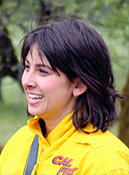 LINDSEY HENDRICKS-FRANCO
LINDSEY HENDRICKS-FRANCO
INTEGRATIVE BIOLOGY
Ph.D. CANDIDATE
As the frequency and intensity of wildfires increase, it is urgent to elucidate the mechanisms that drive post-fire ecosystem recovery. Soil ecological knowledge has the potential to direct successful recovery, across a range of ecosystem and habitat types. Lindsey’s research focuses on how plant functional diversity drives post-fire recovery of soils in Northern California chaparral shrublands. Shortly after summer fires, herbaceous plants grow prolifically, likely absorbing nitrogen in ash before it runs off to pollute nearby bodies of water. She uses herb-removal experiments to demonstrate the functional
combinations of plants that maximize post-fire nitrogen retention and soil restoration.
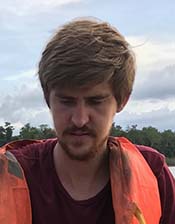 DAVID KURZ
DAVID KURZ
ENVIRONMENTAL SCIENCES, POLICY AND MANAGEMENT
Ph.D. CANDIDATE
David's dissertation research focuses on the socio-ecological dynamics shaping threatened bearded pig populations in Borneo, at the landscape, regional, and mega-island levels. Some of his questions include: How do natural and anthropogenic barriers affect bearded pig gene flow in a fragmented landscape? What are the motivations and methods for pig hunting among Sabah's indigenous peoples, and how has hunting changed with modernization? And, what are the broad-scale environmental and social factors correlated with bearded pig occupancy patterns? To approach these issues, David is taking a multidisciplinary approach, involving genetic, social science, and spatial modeling methods.
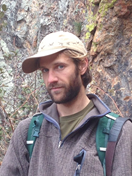 ISAAC H. LICHTER MARCK
ISAAC H. LICHTER MARCK
INTEGRATIVE BIOLOGY
Ph.D. CANDIDATE
Isaac studies the diverse flora of the North American deserts with the goal of understanding the mechanisms underlying diversification and the ecological factors maintaining the resilience of rare plant species. He is currently studying the rock daisies (Perityleae; Asteraceae), a diverse group of arid-adapted plants with a high instance of threatened species in the Death Valley region of Eastern California. His work combines molecular phylogenetics with models of geology and paleoclimate to understand how species have been and are being impacted by global change.
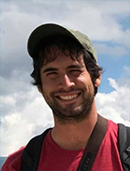 CLAY NOSS
CLAY NOSS
ENVIRONMENTAL SCIENCE, POLICY AND MANAGEMENT
Ph.D. CANDIDATE
The global extinction crisis has thrown the importance of fundamental ecological questions into sharp relief. What are the consequences of the addition or removal of species from a community? How do permutations to the length of food chains influence the role of species in communities? Clay’s research addresses these basic questions by taking advantage of a natural experiment in the White Sands dunes of southern New Mexico. Out of the diverse suite of reptiles found in the desert immediately surrounding the dunes, only three lizards have successfully colonized White Sands. Not only have these lizards escaped most of their interspecific competitors, they have also escaped all of their major predators. Clay uses a combination of observational and experimental approaches to understand the ramifications of this dramatically shifted ecological context.
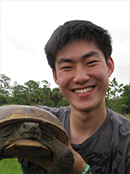 MICHAEL YUAN
MICHAEL YUAN
ENVIRONMENTAL SCIENCE, POLICY AND MANAGEMENT
Ph.D. CANDIDATE
Repeated convergent evolution has captured the interest of generations of biologists in part because it implies some degree of determinism in evolution, whether through natural selection toward common adaptive peaks or shared evolutionary constraints. Michael studies the degree to which phenotypic convergence is mirrored by convergence across levels of biological organization (i.e. morphological, cellular, and genetic) and at various phylogenetic scales (across populations, across closely-related species, and across distantly-related clades). His work focuses on the radiation of Lesser Antillean Anolis lizards, which display phenotypic convergence in response to similar xeric-mesic environmental gradients across islands. Michael’s work aims to contribute to our broader understanding of the mechanistic origins of diversity and how organisms adapt to their environment.
2018 - 2019 Recipients
 LINDSEY HENDRICKS-FRANCO
LINDSEY HENDRICKS-FRANCO
INTEGRATIVE BIOLOGY
Ph.D. CANDIDATE
As the frequency and intensity of wildfires increase, it is urgent to elucidate the mechanisms that drive post-fire ecosystem recovery. Soil ecological knowledge has the potential to direct successful recovery, across a range of ecosystem and habitat types. Lindsey’s research focuses on how plant functional diversity drives post-fire recovery of soils in Northern California chaparral shrublands. Shortly after summer fires, herbaceous plants grow prolifically, likely absorbing nitrogen in ash before it runs off to pollute nearby bodies of water. She uses herb-removal experiments to demonstrate the functional
combinations of plants that maximize post-fire nitrogen retention and soil restoration.
 Kripa Jagannathan
Kripa Jagannathan
Energy and Resources Group
Ph.D. Candidate
Kripa’s research focuses on climate change adaptation, specifically on creating knowledge that enables climate-resilient planning for the future. Successful adaptation to climate change requires solutions that are supported by robust projections of future climate and its impacts. But despite the advances in climate science, information about future trends is very rarely used in adaptation plans. Kripa’s goal is to critically analyze the reasons behind this limited use of climate science, and develop improved science-based knowledge for decision-makers such as farmers and water managers. Kripa combines the fields of climate science, climate impacts and adaptation, risk perception, decision-making under uncertainty, and climate change communication. She uses a mix of ethnographic qualitative methods to understand decision-makers’ climate information needs, and quantitative climate model evaluations and downscaling to develop usable climate information tools.
 ISAAC H. LICHTER MARCK
ISAAC H. LICHTER MARCK
INTEGRATIVE BIOLOGY
Ph.D. CANDIDATE
Isaac studies the diverse flora of the North American deserts with the goal of understanding the mechanisms underlying diversification and the ecological factors maintaining the resilience of rare plant species. He is currently studying the rock daisies (Perityleae; Asteraceae), a diverse group of arid-adapted plants with a high instance of threatened species in the Death Valley region of Eastern California. His work combines molecular phylogenetics with models of geology and paleoclimate to understand how species have been and are being impacted by global change.
 CLAY NOSS
CLAY NOSS
ENVIRONMENTAL SCIENCE, POLICY AND MANAGEMENT
Ph.D. CANDIDATE
The global extinction crisis has thrown the importance of fundamental ecological questions into sharp relief. What are the consequences of the addition or removal of species from a community? How do permutations to the length of food chains influence the role of species in communities? Clay’s research addresses these basic questions by taking advantage of a natural experiment in the White Sands dunes of southern New Mexico. Out of the diverse suite of reptiles found in the desert immediately surrounding the dunes, only three lizards have successfully colonized White Sands. Not only have these lizards escaped most of their interspecific competitors, they have also escaped all of their major predators. Clay uses a combination of observational and experimental approaches to understand the ramifications of this dramatically shifted ecological context.
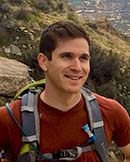 Tim O'Connor
Tim O'Connor
Integrative Biology
Ph.D. Candidate
Plants and plant-feeding insects account for half of all known species, and it is widely thought that interactions between them have driven each group’s tremendous diversification. However, much remains unknown about how plant-insect interactions can generate new species. Does speciation in plants lead to co-speciation in plant-feeding insects, and if so, how? Tim studies these questions in the hot deserts of North America using creosote bush (Larrea tridentata) and the specialized community of creosote-feeding insects as a model system. His work combines field surveys across arid lands of the US and Mexico, behavioral experiments, and genetic approaches to characterize the links between plant and insect speciation.
 MICHAEL YUAN
MICHAEL YUAN
ENVIRONMENTAL SCIENCE, POLICY AND MANAGEMENT
Ph.D. CANDIDATE
Repeated convergent evolution has captured the interest of generations of biologists in part because it implies some degree of determinism in evolution, whether through natural selection toward common adaptive peaks or shared evolutionary constraints. Michael studies the degree to which phenotypic convergence is mirrored by convergence across levels of biological organization (i.e. morphological, cellular, and genetic) and at various phylogenetic scales (across populations, across closely-related species, and across distantly-related clades). His work focuses on the radiation of Lesser Antillean Anolis lizards, which display phenotypic convergence in response to similar xeric-mesic environmental gradients across islands. Michael’s work aims to contribute to our broader understanding of the mechanistic origins of diversity and how organisms adapt to their environment.
2017 - 2018 Recipients
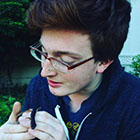 Colin Carlson
Colin Carlson
Environmental Sciences, Policy and Management
Ph.D. Candidate
Colin's research focuses on the relationship between climate change and two irreversible processes of global change: biodiversity loss and infectious disease emergence. His most significant work to date has been leading a study that estimated parasite extinction rates from climate change, a project for which he assembled the largest spatial database of macroparasite occurrences currently available to researchers worldwide. His other projects fall at various points on the gradient between conservation biology and public health, and have included the extinction status and history of high-profile species like the Carolina parakeet, Spix's macaw, and the thylacine; the impacts of climate change on host-parasite assemblages and the need for parasite conservation; and the eco-epidemiology of emerging diseases like anthrax, Ebola and Zika virus.
 Kripa Jagannathan
Kripa Jagannathan
Energy and Resources Group
Ph.D. Candidate
Kripa’s research focuses on climate change adaptation, specifically on creating knowledge that enables climate-resilient planning for the future. Successful adaptation to climate change requires solutions that are supported by robust projections of future climate and its impacts. But despite the advances in climate science, information about future trends is very rarely used in adaptation plans. Kripa’s goal is to critically analyze the reasons behind this limited use of climate science, and develop improved science-based knowledge for decision-makers such as farmers and water managers. Kripa combines the fields of climate science, climate impacts and adaptation, risk perception, decision-making under uncertainty, and climate change communication. She uses a mix of ethnographic qualitative methods to understand decision-makers’ climate information needs, and quantitative climate model evaluations and downscaling to develop usable climate information tools.
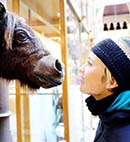 Erin Jarvis
Erin Jarvis
Integrative Biology
Ph.D. candidate
Our world teems with a captivating diversity of life, but just how do these unique forms progress from a single cell to a specialized organism? Erin is using CRISPR/Cas9 mutagenesis in the amphipod crustacean model Parhyale hawaiensis to study the function of the Homeotic (Hox) genes--a set of highly conserved regulatory genes critically important to all animals, from a fruit fly to you--in specifying appendage type and neuromuscular integration during individual development in order to address larger questions on how changes in the patterning of these genes may have provided a mechanism of diversification over evolutionary time. She believes that by better understanding how to build distinct forms, we may garner a greater appreciation of life's diversity, and will be better equipped to tackle anthropogenically-induced loss of diversity, congenital defects, and the genome-editing revolution that is upon us.
 Yuzhong Liu
Yuzhong Liu
Chemistry
Ph.D. Candidate
Covalent organic frameworks are a new class of crystalline materials that are made by linking organic building units through strong covalent bonds. Owing to the ability to precisely control the geometry and functionality of extended structures, Yuzhong designed and synthesized weaving materials that are resilient yet robust. By using the copper-bisphenanthroline templated approach, organic threads are woven into extended frameworks with atomic precision; these templates can be removed post-synthetically, leading to higher degrees of freedom in the structure while preserving the underlying connectivity. The dynamic nature and chemical stability of such materials allows for heavy metal sequestration from water and CO2 reduction upon incorporation of electrocatalysts such as cobalt-porphyrin.
 Tim O'Connor
Tim O'Connor
Integrative Biology
Ph.D. Candidate
Plants and plant-feeding insects account for half of all known species, and it is widely thought that interactions between them have driven each group’s tremendous diversification. However, much remains unknown about how plant-insect interactions can generate new species. Does speciation in plants lead to co-speciation in plant-feeding insects, and if so, how? Tim studies these questions in the hot deserts of North America using creosote bush (Larrea tridentata) and the specialized community of creosote-feeding insects as a model system. His work combines field surveys across arid lands of the US and Mexico, behavioral experiments, and genetic approaches to characterize the links between plant and insect speciation.
 Grace C. Wu
Grace C. Wu
Energy and Resources Group
Ph.D. candidate
Grace studies the land system impacts of energy development. In geographies as diverse as California, India, and South Africa, energy systems are on the cusp or in the midst of major transitions from conventional to renewable technologies. How can these transitions be leveraged as opportunities for cost-effective, socially-responsibly, and sustainable energy development? By examining the extent and the location of trade-offs between habitat conservation and renewable resource extraction, Grace is identifying areas that yield climate and conservation win-win solutions. To realize these solutions, she has also demonstrated the value of better incorporating environmental impacts in the power plant siting and overall energy planning process for lower-impact development outcomes. Grace's findings reveal that it is not only possible, but cost-effective, to achieve climate and conservation goals in many of these transitioning regions.
2016-2017 Recipients
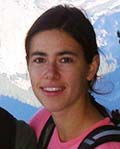 Gabrielle Boisrame
Gabrielle Boisrame
Civil and Environmental Engineering
Ph.D candidate
Gabrielle's work addresses a unique experiment conducted in the Illilouette Creek Basin in Yosemite National Park where a natural fire regime has been allowed to establish since 1972 (fires are routinely suppressed in almost all other forests in California). Gabrielle uses a combination of remote sensing data, field observations and ecohydrological modeling to characterize how fire has changed the vegetation structure and hydrology of the Illilouette Creek Basin. She hopes this work will support future land management decisions that include natural disturbances which increase the ecosystem's diversity and reduce sensitivity to drought.
 Christopher Hann-Soden
Christopher Hann-Soden
Plant and Microbial Biology
Ph.D candidate
What steers the evolution of fungi, and how do evolving fungi affect our environment? Christopher is tackling questions in evolutionary biology using the latest genomic tools to understand how our world is shaped by fungi. The flow of genes between or within a species can drastically affect its evolutionary trajectory, and Christopher is studying how changes in gene flow can change the course of evolution. Climate change is also altering the course of evolution, and Christopher is collaborating with climate modelers to understand how the decomposers of tomorrow will further alter Earth's climate. These questions are fundamental to understanding patterns of diversity across all life, as well as the impact evolution has on our environment.
 Erin Jarvis
Erin Jarvis
Integrative Biology
Ph.D. candidate
Our world teems with a captivating diversity of life, but just how do these unique forms progress from a single cell to a specialized organism? Erin is using CRISPR/Cas9 mutagenesis in the amphipod crustacean model Parhyale hawaiensis to study the function of the Homeotic (Hox) genes--a set of highly conserved regulatory genes critically important to all animals, from a fruit fly to you--in specifying appendage type and neuromuscular integration during individual development in order to address larger questions on how changes in the patterning of these genes may have provided a mechanism of diversification over evolutionary time. She believes that by better understanding how to build distinct forms, we may garner a greater appreciation of life's diversity, and will be better equipped to tackle anthropogenically-induced loss of diversity, congenital defects, and the genome-editing revolution that is upon us.
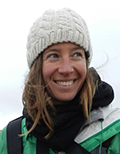 Lydia Vaughn
Lydia Vaughn
Energy Resources Group
Ph.D. candidate
Lydia’s research is rooted in two coupled questions: how does climate influence terrestrial ecosystems and how do terrestrial ecosystems influence climate? To investigate these questions, Lydia studies soil carbon turnover rates, decomposition processes, and their biogeochemical controls. Using isotopic methods in field experiments and across natural gradients, she has been studying ecosystem-climate feedbacks in Arctic Alaska with a cross-disciplinary team of field and lab scientists and modelers. By improving model representations of ecosystem processes, Lydia hopes her research will help predict and monitor changes to sensitive Arctic ecosystems.
 Grace C. Wu
Grace C. Wu
Energy and Resources Group
Ph.D. candidate
Grace studies the land system impacts of energy development. In geographies as diverse as California, India, and South Africa, energy systems are on the cusp or in the midst of major transitions from conventional to renewable technologies. How can these transitions be leveraged as opportunities for cost-effective, socially-responsibly, and sustainable energy development? By examining the extent and the location of trade-offs between habitat conservation and renewable resource extraction, Grace is identifying areas that yield climate and conservation win-win solutions. To realize these solutions, she has also demonstrated the value of better incorporating environmental impacts in the power plant siting and overall energy planning process for lower-impact development outcomes. Grace's findings reveal that it is not only possible, but cost-effective, to achieve climate and conservation goals in many of these transitioning regions.
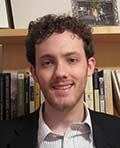 Micah Ziegler
Micah Ziegler
Chemistry
Ph.D. candidate
Micah studies inorganic chemistry with a focus on developing energy and environmentally-relevant catalysis. He synthesizes transition metal complexes that aim to enable earth-abundant, inexpensive, and relatively safe first-row transition metals to activate small molecules, specifically carbon dioxide and methane. Broadly, this research could lead to more energy- and material-efficient reactions that produce fewer waste products, methods to better utilize natural gas, and technologies that reduce carbon dioxide emissions.
2015-2016 Recipients
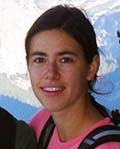 Gabrielle Boisrame
Gabrielle Boisrame
Civil and Environmental Engineering
Ph.D candidate
Gabrielle's work addresses a unique experiment conducted in the Illilouette Creek Basin in Yosemite National Park where a natural fire regime has been allowed to establish since 1972 (fires are routinely suppressed in almost all other forests in California). Gabrielle uses a combination of remote sensing data, field observations and ecohydrological modeling to characterize how fire has changed the vegetation structure and hydrology of the Illilouette Creek Basin. She hopes this work will support future land management decisions that include natural disturbances which increase the ecosystem's diversity and reduce sensitivity to drought.
 Christopher Hann-Soden
Christopher Hann-Soden
Plant and Microbial Biology
Ph.D candidate
What steers the evolution of fungi, and how do evolving fungi affect our environment? Christopher is tackling questions in evolutionary biology using the latest genomic tools to understand how our world is shaped by fungi. The flow of genes between or within a species can drastically affect its evolutionary trajectory, and Christopher is studying how changes in gene flow can change the course of evolution. Climate change is also altering the course of evolution, and Christopher is collaborating with climate modelers to understand how the decomposers of tomorrow will further alter Earth's climate. These questions are fundamental to understanding patterns of diversity across all life, as well as the impact evolution has on our environment.
 Matthew Luskin
Matthew Luskin
Environmental Sciences, Policy and Management
Ph.D. candidate
Matthew’s research uses empirical field studies in Indonesia to understand how rapid oil palm expansion in Southeast Asia threatens tropical rainforest wildlife communities. He takes a ecosystem-approach to understanding how predators, prey, trees, and people are affected. His results show that palm oil causes trophic cascades in the remaining forests.
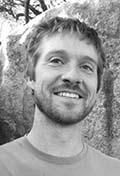 Daniel Portik
Daniel Portik
Integrative Biology
Ph.D. candidate
Dan’s research will test a series of hypotheses regarding the processes generating high species richness in the African tropics. How species-rich taxonomic assemblages are generated and maintained, especially in the tropics, is a subject of great interest to biodiversity researchers and Dan’s project has the potential to provide an outstanding contribution to this field.
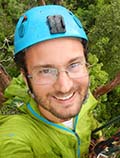 Andrew Rominger
Andrew Rominger
Environmental Science, Policy, and Management and Energy and Resource Management Group
Ph.D. candidate
Andy studies large scale patterns in the richness, relatedness and abundance of species to understand how evolutionary history shapes contemporary biodiversity and how biodiversity might change with mounting anthropogenic pressures. There is a persistent scientific puzzle as to why disparate ecological assemblages show shockingly similar structures in terms of allocation of metabolic energy across individuals and individuals across species. Andy seeks to understand the origin of such generalities and approaches this task with a combination of principles form information theory and statistical physics along with novel data gleaned from museum specimen records and arthropod communities evolving in the dynamic landscape of Hawaii. Andy hopes his work will provide a foundation for studying how global change might drive future shifts in ecological and evolutionary processes.
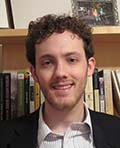 Micah Ziegler
Micah Ziegler
Chemistry
Ph.D. candidate
Micah studies inorganic chemistry with a focus on developing energy and environmentally-relevant catalysis. He synthesizes transition metal complexes that aim to enable earth-abundant, inexpensive, and relatively safe first-row transition metals to activate small molecules, specifically carbon dioxide and methane. Broadly, this research could lead to more energy- and material-efficient reactions that produce fewer waste products, methods to better utilize natural gas, and technologies that reduce carbon dioxide emissions.
2014-2015 Recipients
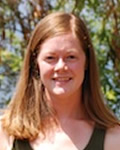 Kathryn Fiorella
Kathryn Fiorella
Environmental Sciences, Policy, and Management
Ph.D candidate
Kathryn's research combines elements of public health, community ecology and socioeconomics to address critical issues surrounding the dynamics of environmental degradation and biodiversity loss in rural Kenya. Her approach combines extensive ecological surveys (primarily of Lake Victoria fisheries), household livelihoods surveys (500+ surveys to date) and public health assessments of child growth and cognitive development. These data sets are brought together to explore linkages and feedbacks between the health of ecosystems and the health and livelihoods of the communities who depend on them.
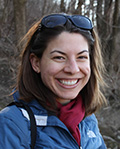 Lauren Hallett
Lauren Hallett
Environmental Science, Policy, and Management
Ph.D candidate
Lauren’s thesis research centers on the relationships between climate, biodiversity and ecosystem services in California rangelands. She uses long-term data analysis and field experiments to test how functional relationships between plant species may moderate the impacts of increased climate variability on rangeland services such as forage production. Lauren also applies her interest in integrating science with environmental management locally, and leads a team of undergraduate researchers to develop methods to improve restoration efforts along Strawberry Creek.
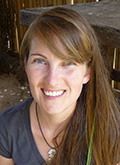 Jennifer Hofmeister
Jennifer Hofmeister
Integrative Biology
Ph.D candidate
Jennifer's research interests focus on understanding the behavioral response of highly phenotypically plastic animals to ecosystem change. Octopuses play an important predatory role in almost every coastal environment, yet we know little about their behavioral response to changes in their environment. Understanding this concept could aid in issues surrounding biodiversity loss and fisheries management. Jennifer uses a combination of SCUBA surveys, ecological modeling, food web analysis, and behavioral experiments to understand how and why octopuses interact with varying components of their community, primarily on Catalina Island. She also dedicates much of her time to programs and conferences encouraging young women to stay in science, as well as training the next generation of scientific SCUBA divers.
 Abby Knight
Abby Knight
Chemistry
Ph.D candidate
Abby is working towards identifying materials for selective metal binding that can be applied to water remediation and the improvement of metal separation procedures. As selective metal chelation is relatively unexplored area, she is using a combinatorial library approach to explore interactions that enhance affinity and selectivity. Abby is currently focusing on identifying chelators for hexavalent chromium, a prevalent toxin, but she is beginning to apply the developed procedures to other applications including trivalent lanthanide ion separations, currently caustic and inefficient processes.
 Matthew Luskin
Matthew Luskin
Environmental Sciences, Policy and Management
Ph.D. candidate
Matthew’s research is focused on understanding how rapid oil palm expansion in Southeast Asia is threatening wildlife communities. He is conducting empirical field studies in Indonesia, utilizing a diversity of sociological and ecological research methods. His research is elucidating the long-term follow on impacts of oil palm plantations on wildlife and human communities.
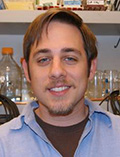 Ryan Melnyk
Ryan Melnyk
Plant and Microbial Biology
Ph.D candidate
Ryan's research focuses on bacterial reduction of perchlorate, a toxic compound found in drinking water. His work integrates comparative genomics, genetics, and biochemistry in an effort to uncover how this metabolism functions, how it is regulated, and how perchlorate reducers deal with the reactive intermediates that are produced. A deeper understanding of these concepts may enable the design of more effective biological systems for perchlorate removal.
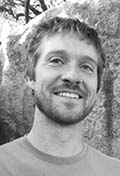 Daniel Portik
Daniel Portik
Integrative Biology
Ph.D. candidate
Dan’s research will test a series of hypotheses regarding the processes generating high species richness in the African tropics. How species-rich taxonomic assemblages are generated and maintained, especially in the tropics, is a subject of great interest to biodiversity researchers and Dan’s project has the potential to provide an outstanding contribution to this field.
2013-2014 Recipients
 Joshua Apte
Joshua Apte
Assistant Professor, University of Texas at Austin
Ph.D. awarded 2013
Joshua is an Assistant Professor in the Department of Civil, Architectural and Environmental Engineering at the University of Texas at Austin. His main area of expertise is human exposure to urban vehicle emissions. Joshua is looking at ambient air quality in New Delhi, which is one of the most severely polluted cities in the world. He is helping to advise the government on the science and policy aspects of improving air quality in India.
 Danielle Christianson
Danielle Christianson
Energy and Resources Group
Ph.D. candidate
Danielle studies microclimate: how vegetation responds to it; how it may occur in a warmer future; and how it scales up to climate represented at coarser spatial and temporal scales that are commonly used in models. She observes tree seedlings and measures the physical environment in Sequoia National Park to address these ecological questions. In addition, she works to improve awareness of science and the natural world through visualizations and is a member of the Berkeley Center for New Media.
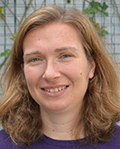 Cristina Poindexter
Cristina Poindexter
Postdoctoral Researcher, Lawrence Berkeley National Laboratory
Ph.D. awarded 2014
Since completing her Ph.D. in Civil and Environmental Engineering at UC Berkeley, Cristina has worked as postdoctoral fellow on the AmeriFlux management project at Lawrence Berkeley National Laboratory. Cristina works to review and standardize carbon dioxide flux data from the AmeriFlux network so that these data can be used to answer questions about the global terrestrial carbon sink.
*Lauren Hallett, Jennifer Hofmeister, Abby Knight, and Ryan Melnyk were also awarded Fellowships in 2013-2014. For their bios, please see 2014-2015 recipients.
2012-2013 Recipients
 Nicholas Matzke
Nicholas Matzke
Postdoctoral Fellow, NIMBios, University of Tennessee, Knoxville
Ph.D. awarded 2013
Nick is a postdoctoral fellow in mathematical biology at the National Institute for Mathematical and Biological Synthesis (NIMBioS) at the University of Tennessee, Knoxville. He has also been awarded the Australian Discovery Early Career Research Award to work with Craig Moritz at Australia National University in Canberra. He is developing a method to jointly estimate distribution models for a group of related species, linking the large-scale processes studied by historical/phylogenetic biogeography with the fine-scale environmental niche models used in species distribution modeling.
 Joey Pakes
Joey Pakes
Integrative Biology
Ph.D. awarded 2013
Joey received her Ph.D. from UC Berkeley in 2013. Her research focused on dark, low-oxygen, anchialine caves, in which a marine layer rests beneath one or more isolated layers of brackish or freshwater. Most anchialine caves contain low invertebrate densities, yet some have inexplicably large biomass of shrimp and remipedes, a rare crustacean found only in subtropical anchialine caves. She integrated studies of geochemistry, microbiology, food web dynamics, and behavior to better understand whether chemosynthesis correlates with macrofaunal density and diversity as well as feeding behaviors in these extreme ecosystems.
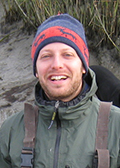 Daniel Richter
Daniel Richter
Postdoctoral Fellow, Station Biologique de Roscof, France
Ph.D. awarded 2013
Daniel’s Ph.D. research focused on choanoflagellates, a group of globally distributed marine and freshwater heterotrophic unicellular eukaryotes. He is currently a postdoctoral fellow at the Station Biologique de Roscoff in France, where he has extended his research on choanoflagellates to include the breadth of unicellular eukaryotic diversity as part of the Tara Oceans Project. They have collected surface ocean samples from 150 globally distributed sites at two depths and multiple size fractions, spanning a range from viruses to the smallest animals. Daniel is analyzing three types of sequence data to examine how species distributions and their global patterns of activity help define the ecology of the world’s oceans.
* Joshua Apte, Danielle Christianson, and Cristina Poindexter were also awarded Fellowships in 2013-2014. For their bios, please see the 2013-2014 recipients.
2011-2012 Recipients
 Manisha Anantharaman
Manisha Anantharaman
Environmental Science, Policy, and Management, UC Berkeley
Ph.D. candidate
Manisha’s dissertation evaluates how middle class-led initiatives to promote sustainable waste management and transportation systems affect Bangalore’s poor and working classes. Using a participatory and community-based research approach, she looked at the conditions under which waste management and transportation systems can be made more environmentally sustainable, while also enhancing the livelihoods and experiences of Bangalore’s working poor. After she receives her Ph.D. in May 2015 she will become an Assistant Professor at Saint Mary’s College of California.
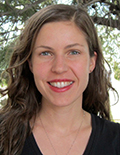 Tanya Renner
Tanya Renner
Assistant Professor, San Diego State University
Ph.D. awarded 2011
Tanya recently accepted an Assistant Professorship at San Diego State University. Her research will focus on evolutionary genetics and genomics, systematics, and the effects of multi-species interactions on form and function. Previously she had been collaborating with Dr. Wendy Moore at the University of Arizona to study the evolution of the chemosensory system in beetles. Her postdoctoral research has been funded through the National Institutes of Health as part of the IRACDA program that provides training and mentorship in research and teaching.
 James Schnable
James Schnable
Assistant Professor, University of Nebraska-Lincoln
Ph.D. awarded 2012
James is an Assistant Professor at the University of Nebraska-Lincoln. He received an NSF Plant Genome postdoctoral fellowship than enabled him to study at the Donald Danforth Plant Science Center in St. Louis MO, and the Chinese Academy of Agricultural Sciences in Beijing, China. His research looks at the regulation of gene expression in plants using comparative genomics and gene expression data.
 Andrea Silverman
Andrea Silverman
Postdoctoral Fellow, UC Berkeley
Ph.D. awarded 2013
Andrea is a postdoctoral fellow at UC Berkeley in the Department of Civil and Environmental Engineering where she continues to research treatment of human waste for reuse. She is working on developing an improved model of sunlight inactivation of bacteria, as well as trying to better understand why laboratory-grown and environmentally-sourced bacteria have different susceptibilities to sunlight.
* Daniel Richter, Joey Pakes, and Nicholas Matzke were also awarded Fellowships in 2011-2012. For their bios, please see the 2012-2013 recipients.
2010-2011 Recipients
 Steven Bellan
Steven Bellan
Postdoctoral Researcher, University of Texas at Austin
Ph.D. awarded 2012
Steven is a postdoctoral fellow at the Center for Computational Biology and Bioinformatics at the University of Texas at Austin. Trained in epidemiology, wildlife ecology, and applied mathematics, Steven combines innovative statistical methods with high performance computing to discover the processes that shape outbreaks and the pressure points for containing them. His work has provided critical insights into the drivers of Africa’s devastating HIV epidemics, and strategies for mitigating outbreaks of Ebola, anthrax, and rabies worldwide.
 Chris Golden
Chris Golden
Director of HEAL (Health & Ecosystems: Analysis of Linkages)
Ph.D. awarded 2011
Chris is currently based at the Harvard School of Public Health and is the Director of HEAL, a 25- institution research consortium led by Wildlife Conservation Society. His current research focuses on the interface of ecosystem service provisioning and human health, specifically in the context of global trends in biodiversity loss and ecosystem transformation. Through a series of empirical research programs, HEAL hopes to demonstrate the value of ecosystem integrity in protecting human health. To increase HEAL's policy reach, Chris serves on both the IPBES (Intergovernmental Platform on Biodiversity and Ecosystem Services) and the CBD/WHO joint task force on biodiversity and human health.
 Lars Plate
Lars Plate
Postdoctoral Fellow, Scripps Research Institute
Ph.D. awarded 2013
Lars research for his Ph.D. focused on elucidating the biological role of nitric oxide (NO) sensing pathways in the bacteria Shewanella oneidensis and Vibrio choleraein. Currently he is working as a postdoctoral fellow in the lab of Jeffery Kelly at the Scripps Research Institute in San Diego, CA. He is studying how protein folding in the endoplasmic reticulum can be modulated to develop new therapeutic approaches for a broad set of systemic amyloid diseases.
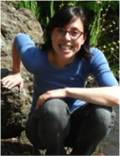 Chodon Sass
Chodon Sass
Postdoctoral Researcher, UC Berkeley
Ph.D. awarded 2010
Chodon received her Ph.D. in Plant Biology from UC Berkeley in 2010. She then completed a postdoctoral fellowship with Dr. Craig Moritz at UC Berkeley working on biogeography and next generation sequencing in Australian reptiles. She later worked in Professor Chelse Specht's Lab at UC Berkeley working on comparative methods for phylogenetic analyses as part of the NSF funded Arbor Initiative. This initiative takes on the daunting volumes of data researchers face, looking at how to organize that information into a usable format. This project team is creating software tools to develop a way to visually portray evolutionary data so scientists can see, at a glance, how organisms are related. The results have the potential to transform the way biologists test evolutionary and ecological hypotheses.
*Manisha Anantharaman, James Schnable, and Andrea Silverman were also awarded Fellowships in 2010-2011. For their bios, please see the 2011-2012 recipients above.
2009-2010 Recipients
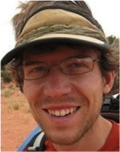 Christopher Ellison
Christopher Ellison
Postdoctoral Fellow
Ph.D. awarded 2011
After completing his Ph.D in 2001, Chris was awarded a postdoctoral fellowship from the National Institutes of Health to use functional genomic approaches to study the evolution of gene regulatory networks in the laboratory of Professor Doris Bachtrog in the Department of Integrative Biology at UC Berkeley. The results of his research were recently published in the journal Science.
 David Soergel
David Soergel
Software Engineer, Google
Ph.D. awarded 2010
David is a software engineer at Google. Previously he was a research scientist in computer science at the University of Massachusetts, Amherst where he worked on large-scale machine learning infrastructure for natural language processing, scientific bibliometrics, and open peer review. He received his Ph.D. in Biophysics, where he worked on data analysis methods in environmental genomics.
 Eric Steen
Eric Steen
CEO and Founder, Lygos, Inc.
Ph.D. awarded 2010
Eric is the CEO and Founder of Lygos, Inc., where they use biology to convert low-cost sugar to high-value chemicals. Previously, Eric assisted in securing and managing projects for the Joint Bioenergy Institute (JBEI). He led their efforts to engineer biocatalysts for the conversion of sugars into fuels and chemicals, which are now being commercialized. He has served as an advisor and consultant to the US National Petroleum Council.
 Michael Wasserman
Michael Wasserman
Assistant Professor, St. Edward’s University, Austin, Texas
Ph.D. awarded 2011
After receiving his Ph.D. in 2011, Michael became a Tomlinson Postdoctoral Research Fellow at McGill University in Montreal. Now at St. Edward’s University in Austin, Michael’s research focuses on phytoestrogens in wild primate diets. He will spend this coming summer at the Max Planck Institute for Evolutionary Anthropology in Leipzig, Germany, working on new collaborations focused on chimpanzee and traditional human hunter-gatherer diets.
 Kelly Wrighton
Kelly Wrighton
Assistant Professor, Ohio State University
Ph.D. awarded 2010
Kelly is an Assistant Professor at Ohio State University in the microbiology department. Her research investigates the role microbes play in methane producing ecosystems, with a particular interest in natural gas management, greenhouse gas emissions from wetlands, and protection of humans from gastrointestinal disease. Previously she was a postdoctoral researcher at UC Berkeley specializing in the the physiology of microbes.
* Chodon Sass, Lars Plate, and Steve Bellan were also awarded Fellowships in 2009-2010. For their bios, please see the 2010-2011 recipients above.
2008-2009 Recipients
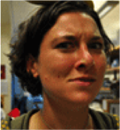 Lillian Fritz-Laylin
Lillian Fritz-Laylin
Molecular and Cell Biology
Ph.D. awarded 2010
After completing her Ph.D., Lillian was a postdoctoral scholar in Professor Dyche Mullins' lab at UCSF School of Medicine, identifying and characterizing genes required for cell migration, a process important in human development, immunity, cancer metastasis, as well as for single celled organisms that bridge the food chain between bacteria and animals. Lillian has performed a comparative genomics screen that identified 112 gene families conserved only in organisms capable of actin-based cell motility. She also looked at the phenotype of cells depleted of the gene products, using human white blood cells. So far, several novel genes have promising phenotypes, including reduced migration, and aberrant actin structures.
 Philip Johnson
Philip Johnson
Assistant Professor, University of Maryland
Ph.D. awarded 2009
Philip is an Assistant Professor of Biology at the University of Maryland. Previously he was a research fellow in the Rustom Antia Lab at Emory University. His current research interests include immune system dynamics viewed through the lens of population genetics, methods for estimating contamination in ancient DNA samples, and understand mutation rate evolution.
 Kristin Robrock
Kristin Robrock
Managing Engineer, Exponent, Inc.
Ph.D. awarded 2008
Kristin is an environmental engineer and microbiologist at Exponent, Inc. where she specializes in biodegradation and the fate of chemicals in the environment. She focuses on emerging contaminants, chlorinated solvents, in-situ bioremediation, and analytical chemistry. During her Ph.D. work, Kristin studied the degradation of the flame retardants polybrominated diphenyl ethers (PBDEs) by aerobic and anaerobic bacteria and delineated the degradation pathways and determined the conditions necessary for these biological processes to occur.
*Christopher Ellison, David Soergel, Eric Steen, Michael Wasserman were also awarded Fellowships in 2008-2009. For their bios, please see the 2009-2010 recipients above.
2007-2008 Recipients
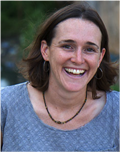 Ashley Murray
Ashley Murray
Founder & CEO, Waste Enterprisers, Accra, Ghana
Ph.D. awarded 2009
Since completing her Ph.D. at UC Berkeley, Ashley worked as a postdoctoral fellow at UC Berkeley's Institute of Urban and Regional Development based at the International Water Management Institute in Accra, Ghana. In 2010, using her considerable expertise is in the design and implementation of reuse-oriented wastewater and fecal sludge treatment systems, she founded Waste Enterprisers LLC, a business that treats human waste as a resource. The organization recently received a $1.5 million grant from the Bill and Melinda Gates Foundation. Ashley was named to the 2011 class of National Geographic Emerging Explorers.
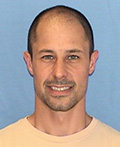 Kabir Peay
Kabir Peay
Assistant Professor, Stanford University
Ph.D. awarded 2008
After obtaining his Ph.D., Kabir continued as a postdoctoral researcher at UC Berkeley and then at Stanford. He worked as an assistant professor at the University of Minnesota from 2011-2012 before returning to Stanford as an assistant professor in September 2012. His primary research focus is community ecology and he encourages people in his lab to use a wide range of experimental approaches and technical tools, such as remote sensing, stable isotopes, gas exchange analyses and molecular genetics, to study a number of ecological topics. He works primarily on plant-fungal interactions.
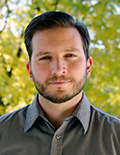 Tom Sharpton
Tom Sharpton
Assistant Professor, Oregon State University
Ph.D. awarded 2009
Prior to becoming an assistant professor at Oregon State University, Tom was a postdoctoral research fellow at the J. David Gladston Institute for Cardiovascular Disease at UCSF. His current research focuses on understanding the abundant array of microorganisms that cover the human body (known as the human microbiome) and how they influence health. He specializes in the development and application of high-throughput computational and statistical tools that characterize the diversity and function of the human microbiome, with the aim of identifying novel disease mechanisms and diagnostics.
 Marjorie "Jody" Westbrook
Marjorie "Jody" Westbrook
Scientist, Invitae
Ph.D. awarded 2011
After completing her Ph.D., Jody went on to work as a scientists at Locus Development, a San Francisco-based startup developing clinical tools and services that will enable more personalized, predictive, preventative, and cost-effective healthcare.
* Philip Johnson, Lillian Fritz-Laylin, Kristin Robrock were also awarded Fellowships in 2007-2008. For their bios, please see the 2008-2009 recipients above.
2005-2006 & 2006-2007 Recipients
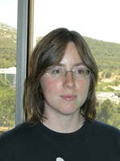 Jessica Cande
Jessica Cande
Molecular and Cell Biology
Ph.D. awarded 2009
Since completing her Ph.D., Jessica continued as a postdoctoral fellow in the Prud’homme and Gompel lab at the IBDML in Marseille. Her research focuses on understanding the evolution and genetics of innate courtship behavior in diverse fruit fly species.
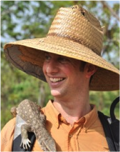 Adam Leaché
Adam Leaché
Integrative Biology
Ph.D. awarded 2008
Upon completion of his Ph.D., Adam took on the position of Assistant Professor in the Department of Biology at the University of Washington. Research in his lab focused on phylogenetics, systematics, phylogeography, and species delimitation. Adam and his lab staff and students study natural populations and conduct extensive fieldwork to collect specimens for their research. The focus is currently on amphibians and reptiles, but the lab has on-going projects focused on birds, mammals, and plants.
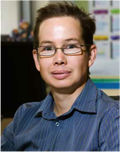 Gene Tyson
Gene Tyson
Environmental Science, Policy, and Management
Ph.D. awarded 2006
After obtaining his Ph.D, Gene went on to become Assistant Professor, Senior Research Fellow at the Advanced Water Management Centre, and Deputy Director at the Australian Centre for Ecogenomics at the University of Queensland in Brisbane, Australia. He is a microbial ecologist whose research applies molecular approaches to understand the structure and function of microbial communities in the environment. Following his Ph.D., at the Massachusetts Institute of Technology (2006-2009), he conducted postdoctoral research work on the composition, functional potential, regulation, and evolution of complex marine microbial communities at sites around the world. His research interests at the Advanced Water Management Centre include molecular microbial ecology, microbial diversity, microbial evolution, the role of microorganism in the biogeochemical cycles that underpin life on Earth.
*Ashley Murray, Kabir Peay, Tom Sharpton were also awarded Fellowships in 2006-2007. For their bios, please see the 2007-2008 recipients above.